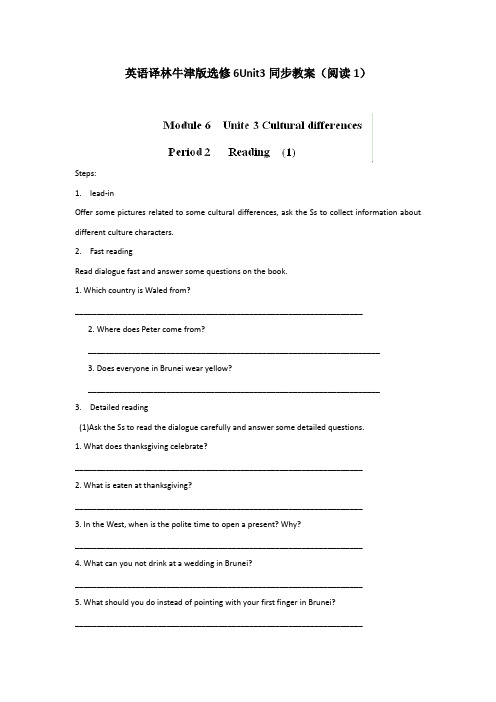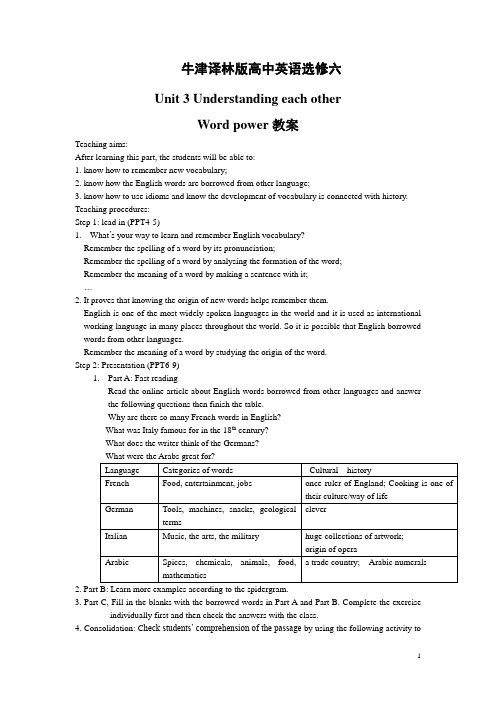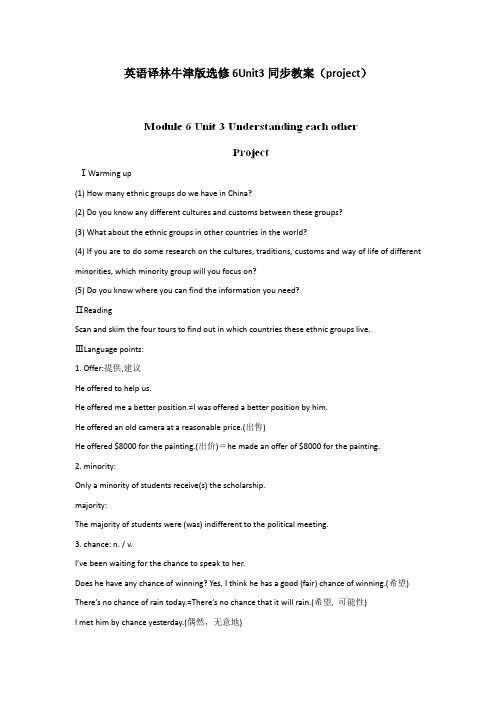高二英语译林版选修6教案:Unit3 语法 含解析 精品
高二英语选修6学案:语法解读 Unit3Ahealthylife 含解

方式状语
that
sb. do sth.
It was in this way that he did the experiments.他正是通过这种方式做实验的。
注意:(1)被强调的主语是第一人称I时,剩余部分的谓语动词要在人称和数上与I保持一致。
(2)并不是所有it开头的句子都是强调句,有的是定语从句结构。
It is/was
表语(become的表语)
that
sb. do
It is a pilot that he wishes most to become.他最希望的是成为一名飞行员。
It is/was
时间状语
that
sb. do sth.
It was last night that Ann Peters’ husband rushed her to a nearby hospital.就是在昨晚,安妮·彼德的丈夫立即送她去附近医院。
语法解读
强调句as
主语
that/who
do sth.
It was Ann Peters’ husband that (who) rushed her to a nearby hospital last night.昨晚,正是安妮·彼德的丈夫,立即送她去了附近医院。
(3)判断是否是强调结构的方法:把It is/was…that…删除后,所剩的部分仍然能够是一个完整的句子,则说明这是一个强调结构。否则,可能是形式主语。
It is/was
地点状语
that
sb. do sth.
It was in the shop which was opened last month that he bought the book.就是在上个月开业的那个商店里,他买的那本书。
高二英语译林版选修6教案:Unit3 阅读1 含解析 精品

英语译林牛津版选修6Unit3同步教案(阅读1)Steps:1.lead-inOffer some pictures related to some cultural differences, ask the Ss to collect information about different culture characters.2.Fast readingRead dialogue fast and answer some questions on the book.1. Which country is Waled from?__________________________________________________________________2. Where does Peter come from?___________________________________________________________________3. Does everyone in Brunei wear yellow?___________________________________________________________________3.Detailed reading(1)Ask the Ss to read the dialogue carefully and answer some detailed questions.1. What does thanksgiving celebrate?__________________________________________________________________2. What is eaten at thanksgiving?__________________________________________________________________3. In the West, when is the polite time to open a present? Why?__________________________________________________________________4. What can you not drink at a wedding in Brunei?__________________________________________________________________5. What should you do instead of pointing with your first finger in Brunei?__________________________________________________________________6. What customs do Chinese cities and Brunei have in common?___________________________________________________________________(2) The chat room dialogue outlines differences between cultures, put the subjects of the dialogue in the correct order. Write 1 to 7 in the blanks.Weddings _____ Presents _____ Shoes _____USA/UK cultural differences _____ An American celebration ______Colour of clothing ______Pointing _______Ask the students to read the article again, do the exercises below.1.In Waled’s opinion, the American teacher at his school is quite interested in _____.A.talking about the gifts that they often receive from others.B.talking about the custom of the Thanksgiving Day.C.talking about the cultural differences between America and Britain.D.making lectures about the cultural differences between the US and the UK.2.The Bruneians intend to ________.A.provide alcohol and soft drinks in the wedding ceremony.B.Give guests presents as a souvenirC.See the people’s reaction when giving presents to them.D.Hold an exciting and unique wedding ceremony3.In Italy, guests attending a wedding are expected to _______A.give the newly-weds presentsB.receive presents from the newly-wedsC.sit with the bridegroom and the other menD.sit with the bride and the other women4.According to this text, fill in the blank with the correct word, only one word in each blank.。
高二英语译林版选修6教案:Unit3 welcome 含解析 精品

英语译林牛津版选修6Unit3同步教案(welcome)Ⅰ. Learning Aims:1Enable students to get a general idea of different ways of greeting each other in different countries.2Help students know more about cultural differences3Help students form correct attitudes towards foreign cultures.Ⅱ.Important Difficult Point:Improve students’ speaking and thinking ability.Ⅲ.Form of Activities:Individual, pair or group work and topic discussions.Ⅳ.Brainstorming.1. What does each of the following gestures mean?_____________________________________________________________________________________________________________________________________________________________________________________________________________________2. Do Chinese people use such gestures?_______________________________________________________________________3. Can you show us some other gestures?_______________________________________________________________________Ⅴ. Picture Talking1. Talk about the six pictures ( TB p33) in pairs or groups focusing on the ways of specificgreetings.__________________________________________________________________________________________________________________________________________________________________________________________________________________________________________________________________________________________________________________________________________________________________________________________________________________________________________Ⅵ.Questions.How do we Chinese usually greet each other now?_______________________________________________________________________Ⅶ. How do people from different countries greet each other?1.(Fill in the form)A: It’s strange/ interesting/fascinating/ funny that….What do you think?/How do you find it?/What’s your opinion about…?B: I agree. / I think it’s good manners/polite/acceptable to…Well, I think it’s just like the way we …Sorry I don’t think so./ It’s bad manners/ rude/not acceptable to…____________________________________________________________________________________________________________________________________________________________________________________________________________________________________________________________________________________________Ⅷ. Discussion:Why do you think that we should learn cultural differences between different nations?____________________________________________________________________________________________________________________________________________________________________________________________________________________________________________________________________________________________2. Which of the following words indicate the right attitudes towards cultural differences?A.respectB. tolerateC. look down uponD. appreciateE. hateF. understandG. reject1.Through discussion please form correct attitudes towards foreign cultures._______________________________________________________________________________ _____________________________________________________________________________________________________________________________________________________________________________________________________________Ⅸ. Consolidation.1. A guessing game: (Match the idioms with its meaning).( )1. With open arms.( ) 2. To keep a straight face. a. To disregarding sth.( ) 3. To put your heads together. b.To be involved in a project that is too difficult. ( ) 4. To be all ears. c To act casually, to be oneself.( ) 5. To shrug something off. d To listen attentively.( ) 6. To be in over one’s head. e. To work together with someone;( ) 7. To keep one’s nose out of f. to share information.someone’s business g .Not to show one’s true feeling; not to laughunder most circumstances.( ) 8. To pull a long face. h .To show that one is annoyed.( ) 9. To let one’s hair down. i .To pay attention to only one’s own concerns.j .In a welcome and enthusiastic manner.。
牛津译林版高中英语选修六Unit3Understandingeachothe

Unit3 Understanding each other Task1教材:牛津高中英语(模块六)高二上学期文档内容:教学设计—教案单元:Unit 3 Understanding each other板块:Task 1Thoughts on the design:Task板块的主要目的是写一封关于解释文化误解的道歉信。
本节课的主要目的是听读结合,引导学生在完成任务的进程中利用英语,并以各类任务的形式培育学生听、说和读的技术。
该节课的内容是以解释文化误解为主线,要求学生将听到的和读到的材料转换成填空的形式,让学生在教学活动顶用英语参与和完成各类真实而成心义的任务,从而培育获取信息的能力。
为了达到那个目标咱们能够分以下三步来走,但这节课只要完成一半任务Step1:为了写这封信第一要获取信息(SKILLS BUILDING1),这部份教会学生如何找到有效信息,能够利用step1里面的材料Teaching aims:After learning this part, the students will be able to:1.listen to two dialogues to fill in the blanks;2.read a passage to find out the taboos;3.understand the cultural differences;4.develop listening and reading ability.Teaching procedures:Step 1: Lead in (PPT4)Today we’ll comple te a text by listening. Before that, we should make it clear that what we should do before and after listening and how we use the skills in practice.Answer the following questions by reading the guidelines on P42.Before listening:What is the first thing we need to do before listening? Why should we do this?What should we do next?How can we decide what the missing words p robably are?What is the fourth point about?After listening:What do you think we should do after we have finished a passage? [Explanation]通过问问题的形式将书上的任务指导展示给学生,然后将重点拿出来放在课件上,如此学生对如何通过听来完成上下文就超级清楚。
高中英语译林选修6课:Unit3SectionⅢ WordpowerGrammarandusage

(1)connect vt.&vi. connect..Байду номын сангаасto/with... connect with (2)connection n. have a connection with have no connection with/to in connection with
连接;联系;关联 把……和……联系起来/连接起来 衔接;与……有联系 联系;关系 与……有关系 与……无关系 关于;与……有关
虚拟语气(Ⅰ)
阅读下列句子,体会黑体部分的用法 1.If I were you,I should try my best to go to college. 2.Were I you,I should try my best to go to college.
3.If he had gone to the party last night,everything would have changed. 4.Had he gone to the party last night,everything would have changed. 5.If it were to be sunny tomorrow,we would go out for a picnic. 6.Were it to be sunny tomorrow,we would go out for a picnic.
理 基 础
巧 突 破
Section Ⅲ Word power & Grammar and usage
全
精
部
剖
析
析
根据提示写出下列单词
1.
n.
期望,盼望
2.
n.
牛津译林版高中英语选修六《Unit 3 Understanding each other》Word power 教案 3

牛津译林版高中英语选修六Unit 3 Understanding each otherWord power教案Teaching aims:After learning this part, the students will be able to:1. know how to remember new vocabulary;2. know how the English words are borrowed from other language;3. know how to use idioms and know the development of vocabulary is connected with history. Teaching procedures:Step 1: lead in (PPT4-5)1.What’s your way to learn and remember English vocabulary?Remember the spelling of a word by its pronunciation;Remember the spelling of a word by analysing the formation of the word;Remember the meaning of a word by making a sentence with it;…2. It proves that knowing the origin of new words helps remember them.English is one of the most widely-spoken languages in the world and it is used as international working language in many places throughout the world. So it is possible that English borrowed words from other languages.Remember the meaning of a word by studying the origin of the word.Step 2: Presentation (PPT6-9)1.Part A: Fast readingRead the online article about English words borrowed from other languages and answer the following questions then finish the table.Why are there so many French words in English?What was Italy famous for in the 18th century?What does the writer think of the Germans?2. Part B: Learn more examples according to the spidergram.3. Part C, Fill in the blanks with the borrowed words in Part A and Part B. Complete the exerciseindividually first and then check the answers with the class.4. Consolidation: C heck students’ comprehension of the passage by using the following activity tofurther.Which words are borrowed from French?Which words are borrowed from Italian?Which words are borrowed from German?Which words are borrowed from Arabic?Step 3: V ocabulary extension (PPT10-13)1. Focus on Part D:These idioms all have a characteristic connection with an animal or a thing. Ask students to read the idiom and guess the meaning of each of them first. Then have students read explanations and learn their meanings.2. Learn more idioms like this:His face is as black as coal.Without glasses she is as blind as a bat.The child is as bright as a button.Be careful of him. He’s as cunning as a fox.The twins are as like as two peas.The beautiful girl is as proud as a peacock.It’s impossible to persuade him.He’s as stubborn as a mule.You can’t expect her to do that.She’s as timid as a rabbit.Step 4: HomeworkFinish the two exercises on page 122 in Workbook.。
高二英语译林版选修6教案:Unit3 project 含解析 精品

英语译林牛津版选修6Unit3同步教案(project)ⅠWarming up(1) How many ethnic groups do we have in China?(2) Do you know any different cultures and customs between these groups?(3) What about the ethnic groups in other countries in the world?(4) If you are to do some research on the cultures, traditions, customs and way of life of different minorities, which minority group will you focus on?(5) Do you know where you can find the information you need?ⅡReadingScan and skim the four tours to find out in which countries these ethnic groups live.ⅢLanguage points:1. Offer:提供,建议He offered to help us.He offered me a better position.=I was offered a better position by him.He offered an old camera at a reasonable price.(出售)He offered $8000 for the painting.(出价)=he made an offer of $8000 for the painting.2. minority:Only a minority of students receive(s) the scholarship.majority:The majority of students were (was) indifferent to the political meeting.3. chance: n. / v.I’ve been waiting for the chance to speak to her.Does he have any chance of winning? Yes, I think he has a good (fair) chance of winning.(希望) There’s no chance of rain today.=There’s no chance that it will rain.(希望, 可能性)I met him by chance yesterday.(偶然,无意地)I chanced to look out of the window and saw the accident.=It chanced that I looked out of the window and saw the accident.(偶然发生,碰巧)4. Opportunity:I lost the opportunity of studying abroad.I missed a good opportunity to give my opinion on it.While staying with the Inuit people you will ha ve the chance to ride on a…(状语从句的省略) Though working from morning till night, his father didn’t get enough food.When working in the factory, he was an advanced worker.While staying in Beijing, he came to see me twice.If playing all day, you will waste your valuable time.5. accountHe gave me a full account of his plan.(说明)I won’t be able to come on this account.(因为这个缘故)The trains were delayed on account of snow.(为..的理由)6. As well as:He speaks Spanish as well as English and French.His children as well as his wife were invited to the party.You might/may (just) as well do…You may as well know the truth.(不妨)7. Believe in:Do you believe in ghosts?(信仰)I believe him, but I don’t believe in him. (信任)Helen believes in jogging for her health.(认为…有益)Th e story is believed (to be) true. It’s believed that he has gone abroad.8. Base on:This story is based on facts.You should base your conclusion on/ upon careful research.9. Home:Is China the home of pottery?(发源地)The home of the kangaroo is Australia.10. meet with:I met with a traffic accident.(遭遇到)11. belong to: (无被动态)The car belongs to me.Used to do…/( be/get/become )used to doing (sth.)/be used to doHe used to swim in the river. (he doesn’t swim in the river)You will soon get used to getting up early.Pens are used to write.12. Hunt for:I hunted the room for the key.He’s hunting for a job.Ⅳ难句解析1. We offer you the chance to visit different minority cultures and experience for yourself their traditions, customs and way of life. (P46)[分析] 1)句子结构分析:此句的主干是We offer you the chance,后面是由and连接的两个不定式to visit ... and experience ...作定语,修饰chance。
高二英语译林版选修6教案:Unit3(阅读2)含解析

英语译林牛津版选修6Unit3同步教案(阅读2)Teaching procedures:Step 1 Revision &Lead-inFill in the blanks according the passage and try to retell the short passage: Mali has to do her homework on 1) _________ differences. So she goes online to chat with others and find some 2)____________ she needs.She gets to know English and American people have 3)___________ differences in culture even though they both speak English。
For example,The British may be 4)_________ when Americans talk about thanksgiving and the huge 5) _________ they eat。
There are different 6)__________ in the West and the East Whey they get presents. Westerners like to open them as soon as they get them。
Though there are 7)________ between wedding 8) __________ in the west,there are also differences between different western countries. In Italy,guests except to get presents from the 9)_______ while the guests are expect to give presents to them in the UK。
- 1、下载文档前请自行甄别文档内容的完整性,平台不提供额外的编辑、内容补充、找答案等附加服务。
- 2、"仅部分预览"的文档,不可在线预览部分如存在完整性等问题,可反馈申请退款(可完整预览的文档不适用该条件!)。
- 3、如文档侵犯您的权益,请联系客服反馈,我们会尽快为您处理(人工客服工作时间:9:00-18:30)。
英语译林牛津版选修6Unit3同步教案(语法)___________________________________________________________Step2 Learning注: 当从句的if省略时, 句子要倒装, 如If I were you, I would not do that.___________________, I would not do that.在if I /he/she/it 之后, 可用were代替was。
两者在意义上没有区别, 但是were更为正式, 特别是在称述心存怀疑的事情时:If she were ready, we would go.在与将来事实相反的条件从句中,我们可以用were to或should +do来表示,如:If I were to fail my English test, I would have to take it again at the end of the term.If he should come tomorrow, I would talk to him about it.虚拟条件句中的省略与倒装在非真实条件句中,如果有were, had, should, 我们可以将if省略,把这些词置于句首,采用倒装形式,如:♦ If I should meet her, I would tell her.= ______________________, I would tell her.♦ If I were in your position, I would do it better.= ______________________, I would do it better.♦ If they had made preparations, they would have succeeded.=________________________, they would have succeeded.Step3 Further learning●错综时间条件句非真实条件句中, 主句谓语动词所表示的动作和条件从句中谓语动词所表示的动作并不同时发生, 这时动词的形式并不完全按照上述表格来进行, 而需要按照各自的时间来调整, 这样的句子就叫错综时间条件句。
e.g.1) If you had followed the doctor’s advice, then you would be all right now.2) If I hadn’t finished my composition by now, I would be working on it tomorrow.3) If she had prepared well for her lessons yesterday, she wouldn’t have so many difficulties now.●含蓄条件句有时一个假设的情况并不用条件从句表示,而用其它方式来表示,这样的句子叫含蓄条件句。
1.用with, without等介词短语或分词短语或者独立主格结构来代替条件从句。
We might have died without your help.=We might have died if you hadn’t helped us.Having known in time, we could have stopped it.= If we had known in time, we could stopped it.Step4 高考链接1. I have no idea what he will do with them all and it took up a lot of time. (P42)[考点1] idea作先行词时的同位语从句。
[考例] Do you have any idea _____ is actually going on in the classroom? (辽宁2005)A.that B.what C.as D.which[考点2] take up[考例1] After he retired from office, Rogers _____ painting for a while, but soon lost interest. (山东2006)A. took upB. saved upC. kept upD. drew uptake up在这里是“开始学习”的意思。
save up储蓄;keep up维持,继续;draw up拟定,起草。
Step5 Discussion:What would you do if you had a…?Magic Lantern, Magic Brush,Magic Stick, Time MachineStep6巩固练习1._______ for the free tickets, I would not have gone to the films so often.A. If it is notB. Were it notC. Had it not beenD. If they were not2. He came late, otherwise he _______ the first bus.A. caughtB. would catchC. would have caughtD. had caught3. Mary was going to the wedding if her friend ________ her.A. hadn’t called onB. didn’t call atC. didn’t call onD. hadn’t called at4. ---Let’s stop watching the boring TVprogramme, Jack!---If you don’t watch it, I ____, either.A. don’tB. won’tC. am notD. stop5. ---Shall I tell John about the bad news?---No, you ____. I think that willmake him sad.A. needn’tB. wouldn’tC. shouldn’tD. mustn’t6. Why did you throw the bottle out of the window? You ____ somebody.A. might hurtB. could have hurtC. would hurtD. must have hurt7. From what I hear about their hotel and theweather, they ___ their holiday very much.A. would have enjoyedB. shouldn’t have enjoyedC. needn’t have enjoyedD. can’t have enjoyed8. ---Did you hear me come in last night?---No, I _____ asleep.A. can’t beB. must beC. must have beenD. couldn’t have been9. ---I’ll pay you by cheque monthly.---I’d rather you ____ me cash weekly.A. payB. will payC. are to payD. paid10. The doctor said, “Sir, you _____ be sitting in this waiting room. It’s for the children only.”A. oughtn’t toB. can’tC. mustn’tD. won’t11. ---Did Wei Hua have breakfastbefore going to school yesterday?---No, but I think he _____ have.A. willB. mayC. shouldD. must12. ---Mum, may I got out and play?---No, you _______ .A. w on’tB. don’tC. aren’t able toD. can’t13. They didn’t want to come with us at first. But then we ______ persuade them.A. had managed toB. were able toC. did try toD. would have to14. ---No one was prepared for Mr Hill’squestions.---I guess we ____ the lesson last night.A.I would readB. ought to readC. should have readD. had read。
